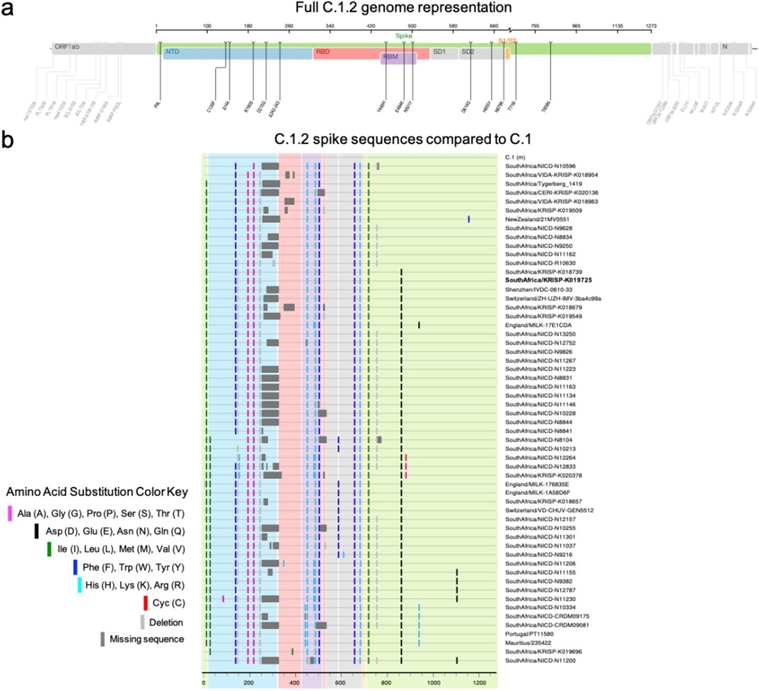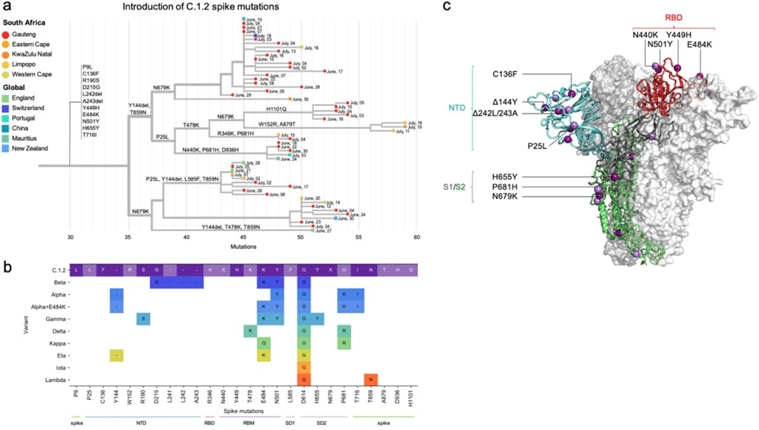
[ad_1]
Scientists from South Africa recently announced that they had found a new variant of Covid-19 which mutates at a rapid rate and can be extremely powerful at evading the protection offered by antibodies.
South Africa’s National Institute of Communicable Diseases said the new variant – C.1.2 – was first detected in May and has now spread to “the majority of provinces in South Africa and in seven other countries in Africa, Europe, Asia and Oceania “.
The variant has caught the attention of scientists due to the speed at which it evolves and mutations within its genome that are similar to those seen in many of the variants of concern and variants of interest, including the Delta.
Where was variant C.1.2 first detected?
According to a pre-print study that has not yet been peer reviewed, the C.1.2 variant was first detected in Mpumalanga and Gauteng provinces in South Africa in May of this year. In June, it was also detected in the provinces of KwaZulu-Natal and Limpopo in South Africa as well as in England and China.
The document indicates that as of August 13, variant C.1.2 has been detected in six South African provinces (including the Eastern Cape and Western Cape), the Democratic Republic of the Congo, Mauritius, New Zealand, Portugal. and Switzerland.
How is this variant unique?
The study found that C.1.2 “substantially mutated” from variant C.1, which was one of the dominant lineages during the peak of infections in the first wave in South Africa.
What sets the C.1.2 variant apart from other strains of Covid-19 is the speed at which it mutated.
The study found that C.1.2 undergoes 41.8 mutations per year, which is “about 1.7 times faster than the current global rate and 1.8 times faster than the initial estimate of the evolution of SARS-CoV-2 “.
 Global detection of C.1.2 sequences (Source: http://www.medrxiv.org)
Global detection of C.1.2 sequences (Source: http://www.medrxiv.org)
This is one of the reasons why scientists are watching the C.1.2 variant closely now because, as the study indicates, this “short period of increased evolution relative to the overall viral evolution rate has also been associated with the emergence of Alpha, Beta and Gamma variants.
The study also found that there was a steady increase in the number of C.1.2 genomes in South Africa each month, from 0.2% of genomes sequenced in May to 1.6% in June and then to 2 % in July.
The study further states: “C.1.2 accumulated a number of substitutions beyond what would be expected from the background rate of change in SARS-CoV-2. This suggests the likelihood that these mutations arose during a period of accelerated evolution in a single individual with prolonged viral infection by virus-host co-evolution.
 Complete representation of the C.1.2 genome (Source: http://www.medrxiv.org)
Complete representation of the C.1.2 genome (Source: http://www.medrxiv.org)
What are the key changes in C.1.2?
Scientists have found that C.1.2 carries some of the mutations previously seen in the C.1 variant. But he detected additional mutations in the ORF1ab, spike, ORF3a, ORF9b, E, M and N proteins.
Several of the leading mutations identified in C.1.2 have already been observed in other variants of concern or interest.
Dr Kerkhove also said that to date WHO has not rated C.1.2 as a variant of concern or variant of interest.
For example, the D614G mutation is common to all these variants, the E484K and N501Y mutations are present in Beta and Gamma, E484K has also been observed in Eta and N501Y in Alpha. In addition, the T478K mutation which was observed in some of the C.1.2 variants is also found in Delta.
Thus, C.1.2 contains many mutations that have been identified in the four COVs (Alpha, Beta, Delta and Gamma) and three VOIs (Kappa, Eta and Lambda). It also has key additional mutations such as Y449H in its receptor binding domain and N679K adjacent to its furin cleavage site.
 (Source: http://www.medrxiv.org)
(Source: http://www.medrxiv.org)
Will Covid-19 vaccines work against this variant?
The study found that some of the mutations the C.1.2 variant carries may make it more effective at evading the immune response.
In addition, many mutations have been associated with better binding to ACE2 and reduced neutralization by antibodies.
But the study indicated that the exact impact of this variant on neutralizing antibodies due to Covid-19 infection or vaccination is still being assessed.
The National Institute of Communicable Diseases in a statement later said, “We are cautious of the implications, as we collect more data to understand the virus of this lineage… Based on our understanding of the mutations in this variant, we suspect that it might be able to partially evade the immune response, but despite this, these vaccines will still offer high levels of protection against hospitalization and death. “
 Presentation of C.1.2. cutting-edge mutations (Source: http://www.medrxiv.org)
Presentation of C.1.2. cutting-edge mutations (Source: http://www.medrxiv.org)
So, is there enough reason to worry?
Dr Maria Van Kerkhove, WHO technical officer, said 100 sequences of C.1.2 have been reported worldwide so far and at present they do not appear to be ‘increasing in circulation’ .
@WHO spoke regularly with South African researchers about their work on sequencing throughout the # COVID-19[FEMALE[FEMININE pandemic. 🙏 We thank the researchers from 🇿🇦 who first presented their findings on variant C.1.2 to the WHO virus evolution working group on July 21.
– Maria Van Kerkhove (@mvankerkhove) August 30, 2021
“WHO has regularly discussed with South African researchers their work on sequencing throughout the COVID-19 pandemic. We are grateful to the South African researchers who first presented their findings on variant C.1.2 to the WHO virus evolution working group on July 21, ”she said. tweeted.
To date, there are around 100 reported C.1.2 sequences worldwide, with the first reports from May 21 from 🇿🇦.
At this time, C.1.2 does not appear to be ⬆️ in circulation, but we need more sequencing to be conducted and shared globally. Delta appears dominant from the available sequences. pic.twitter.com/GaUqRsUFyv
– Maria Van Kerkhove (@mvankerkhove) August 30, 2021
She added: “Right now, C.1.2 doesn’t seem like a circulating up arrow, but we need more sequencing to be conducted and shared globally. Delta appears to be dominant among the available sequences.
A virologist and lecturer in immunology and infectious diseases at the University of Sydney’s Central Clinical School, Dr Megan Steain, told The Guardian scientists are on high alert because of the mutations in the C.1.2 variant.
Steain said, “It contains a number of key mutations that we see in other variants that have become variants of interest or concern. Anytime we see these particular mutations pop up, we’d like to keep an eye on the variant to see what it does… C.1.2 should be good enough, fit enough, and quick enough to outperform Delta at this organizing level. I think we’re still at a point where it might go away, the prevalence is really low. “
So far, the variant has not been able to compete with other dominant strains of Covid in the countries where it has spread. For example, C.1.2 accounted for 3% of Covid positive samples in South Africa in July. That same month, Delta accounted for 89% of positive samples in the country.
But the emergence of a new strain of Covid-19 that is mutating at a rapid rate may be a reminder of the challenges that lie ahead due to the emerging variants.
Richard Lessells, one of the authors of the South African C.1.2 report, told Reuters that the emergence of C.1.2 is a clear sign that “the pandemic is far from over and this virus is exploring always ways to improve potentially. to infect us ”.
Newsletter | Click for the best explanations of the day to your inbox
[ad_2]
Source link